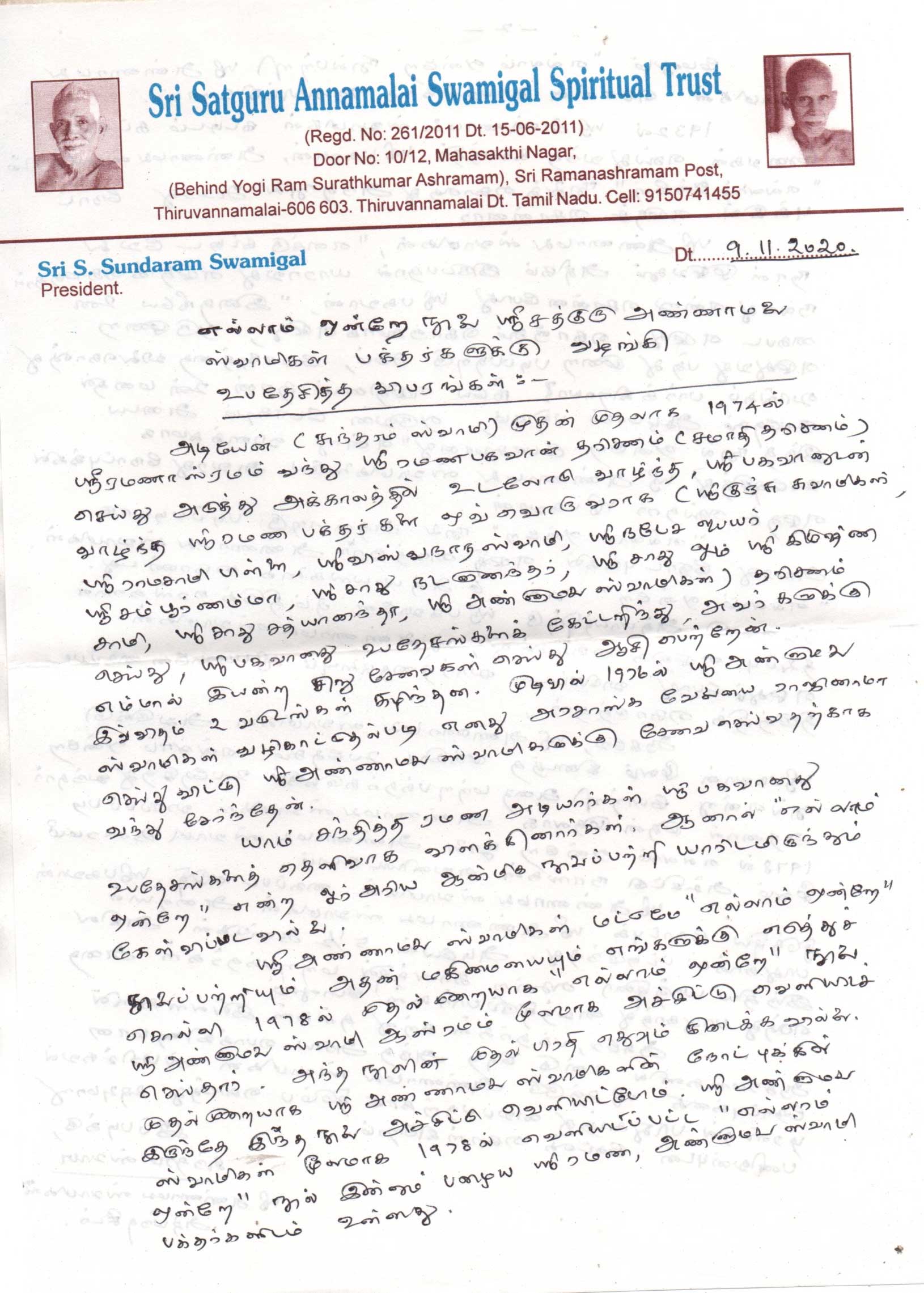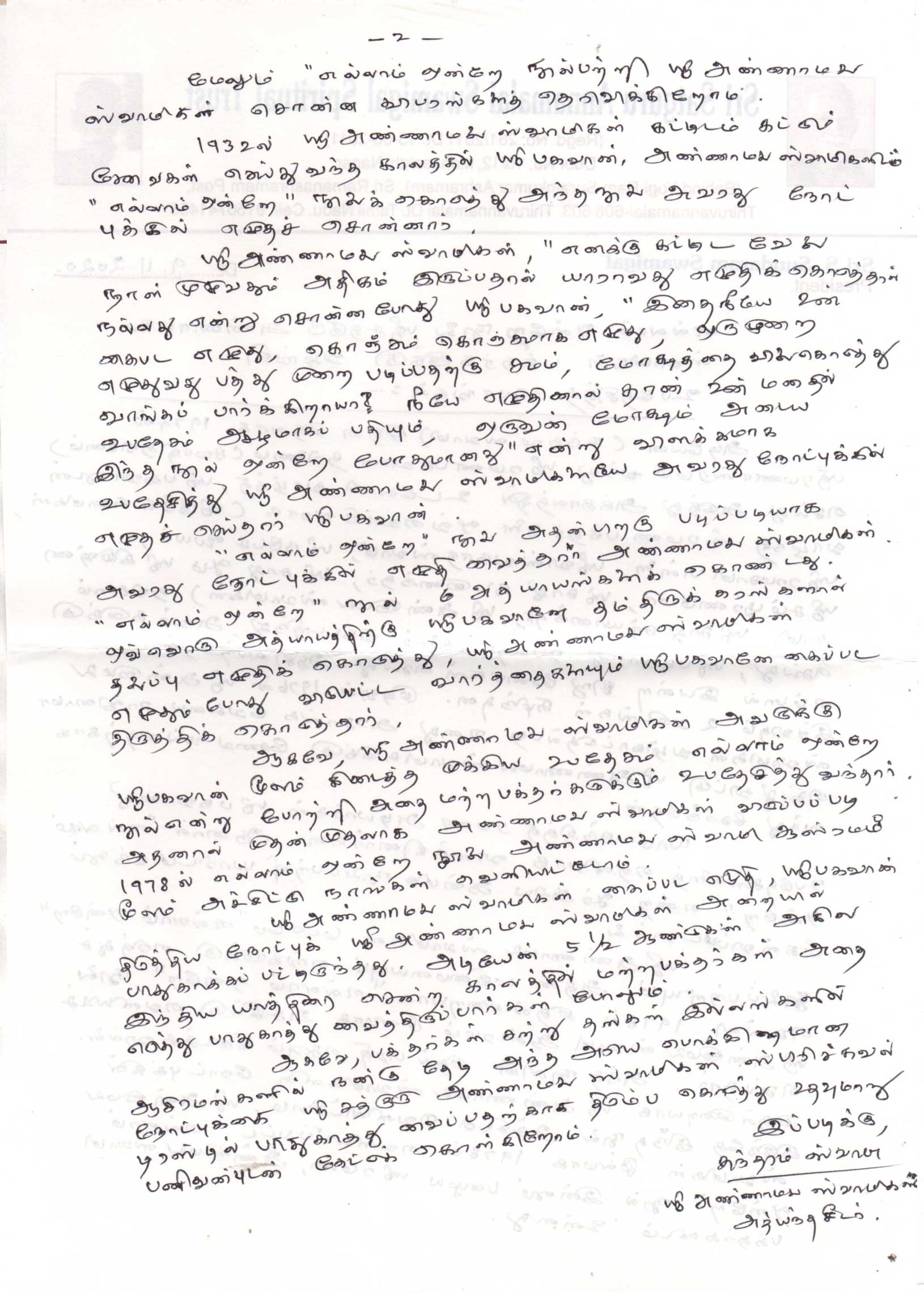This precious book 'Ellam Ondre' or 'All is One' on Advaita Vedanta by Sri. Vaiyai Subramaniam was strongly recommended by Bhagavan Ramana Maharshi to many. According to Sri Annamalai Swami "He laid particular stress on Ellam Ondre, telling me, 'If you want moksha, write, read and practise the instructions in Ellam Ondre.'"
When Sri Annamalai Swami was serving Sri Bhagavan by looking after the construction works of Sri Ramanasramam in 1932, Sri Bhagavan gave him this small book Ellam Ondre in Tamil and asked him to copy this book as is, in Tamil in a notebook. And in this notebook Sri Bhagavan himself wrote the chapter headings for all 6 chapters in his own hand, and Bhagavan made all the corrections as well. The original of this book is sadly no longer with us.
This pocket-sized book 'Ellam Ondre' has 6 chapters. The second chapter titled 'YOU' was quoted often by Sri Annamalai Swami. He even suggested to some seekers that they read this chapter before their daily meditation. Below we present the translation of this second chapter 'YOU' in English.
Note: At the bottom of this page is a note from us, regarding the rights to use this material on our website.
Ellam Ondre - Chapter 2
YOU
1. Who are you? Are you this body? If so, why are you not aware of the crawling of a serpent on this body when you are in deep sleep? So then, can you be this body? No, certainly not. YOU must be other than this body.
2. Sometimes in sleep you dream. There, you identify yourself with someone. Can you be that one? You cannot be. Otherwise, what becomes of that individual on your waking? You are not him. Furthermore, you are embarrassed of having identified yourself with him. Clearly, you are not that particular person. YOU are the one who stands apart from him.
3. The state of dreamless sleep. What is your state then? Can that be your true nature? Surely you will not accept this state of sleep as your true nature. Why? Because you are not so foolish as to identify yourself with the darkness of ignorance which obstructs you from the state you are in. As you are distinguished from all things around, owing to the capacity to know, how can you admit yourself to be the same as ignorance or blankness? Or how can it truly be your real nature? It cannot be. When you persist as the knower who knows “this state is the one of dense darkness ignorant of itself”, how can you be that which you as subject have experienced and condemned as object? Therefore, you are also not the dark ignorance of deep sleep. YOU are other than that.
4. When it is said that even this gross body is not you, can you be any other thing which is yet further away from you? In the same way that you are not this gross body, you are not any of the objects beyond this body, nor are you the body seen as dream within this body, nor are you the form of ignorance called deep sleep? You are distinct from these three forms and this world.
5. These three forms can be reduced to two forms, namely, a state of knowing another as object, and a state of unawareness of even oneself. The former includes the waking and dream states, where you exist as the cogniser of objects, whereas the latter represents deep sleep where you are unaware of even yourself in the absence of cognition of objects. All your experiences are encompassed in these two conditions.
6. If you ask what that true nature is, it is called Turiya, which means the fourth state. This name is used because it was said “the three states of your experience – waking, dream, and deep sleep – are foreign to you and your true state is the fourth, which is different from these three.” Should the three states, waking, dream and deep sleep be taken to form one long dream, the fourth state represents the waking from this dream. Thus, it is more withdrawn than deep sleep, also more wakeful than the waking state. Therefore, your true state is that fourth one which is distinguished from the waking, dream and deep sleep states. YOU are that only.
7. What is this fourth state? It is knowing which does not particularize anything. It is also not without awareness of itself as awareness. That is to say, the fourth state is that knowing which is not conscious of any other as object, but also not unconscious of itself. He who realizes it even for a trice, realizes Truth. YOU are that only.
8. What lies ahead for him who has gained the fourth state? It is not anyone’s experience that one would remain forever in that state, that is, the state of no particular knowledge of objects. He who has realized the fourth state later wakes up in this world, but for him this world is not as before. He sees that what he realized as the unity called the fourth state, shines forth as “all this”. He will not imagine this world as distinct from that unitary knowledge. Thus, what he realized within, he now sees without in a different form. In the place of differentiation perceived in the waking of old, he now perceives non-differentiation in essence everywhere. Now, he is all. There is nothing distinct from himself. His eyes closed or open, howsoever things evolve, it is ever for him ever the one state. This state is called Brahman. This is the state of natural presence. YOU are that true state.
9. There is nothing beyond this state. The words, “inward” and “outward” have no meaning for him. All is one. His body, speech, and mind cannot function selfishly. Their workings will be of grace for the good of all. The fragmentary ‘I’ is lost forever. His ego can never revive. Therefore, he is said to be liberated here and now. He does not live because his body lives nor does he die because his body dies. He is eternal. There is nothing other than He. YOU are He.
10. Who is God? He is grace. What is grace? Awareness without the fragmentary ego. How can one know that there is such a state? Only by realizing this state. The Vedas declare such a one as having realized God and become one with Him. Therefore, the true good which one can get from this world and the true good which one can render unto this world is to realize this state of non-differentiation. In fact, there are no states besides this. They appear in the state of ignorance. For him who knows, there is one state only. YOU are that.
Some background on the rights to use this material on our website.


English Translation of the above
Details of how Sri Annamalai Swamigal presented and taught the book ‘Ellam Onre’ to his devotees
In 1974 this humble devotee (Sundaram Swami) came to Sri Ramanasramam for the first time and had Samadhi Darsanam of Sri Ramana Bhagavan. With his blessings, I had darshan of several Ramana bhaktas who were alive at the time, including Sri Kunju Swamigal, Sri Ramasami Pillai, Sri Viswanatha Swamigal, Sri Natesa Iyer, Sri Sampurnamma, Sri Sadhu Natananandar, Sri Sadhu Om, Sri Krishna Sami, Sri Sadhu Sathyananda and Sri Annamalai Swamigal. I listened to them and learnt the teachings of Sri Bhagavan and got their Blessings while doing whatever service I could do to them.
Like this 2 years passed by. Then in 1976 Sri Annamalai Swamigal himself instructed me to resign my job and come to serve him. The very same day I received his letter, I resigned my government job and left for Tiruvannamalai to serve Swamigal.
The devotees of Bhagavan Sri Ramana whom I met, had clearly explained Sri Ramana’s teachings to me. But I had never heard about the rare spiritual book ‘Ellam Ondre’ from anyone. Only Sri Annamalai Swamigal spoke about this book and its glory. It was in 1978 for the first time that Sri Annamalai Swami had us print this book and released it.
SRI ANNAMALAI SWAMI’S WORDS ABOUT ‘ELLAM ONDRE’
First let me share my memories of what Sri Annamalai Swamigal told us about the book ‘Ellam Ondre’. In 1932 when Sri Annamalai Swamigal was serving Bhagavan by doing construction work for Ramanashram, Sri Bhagavan gave Sri Annamalai Swamigal the book ‘Ellam Ondre’ and asked him to write down the entire book in his notebook.
When Sri Annamalai Swamigal said, “Since I have a lot of construction work the whole day, it will be good if someone else writes it for me.” Sri Bhagavan said “Write this yourself with your own hand. Write little by little. Writing once is equal to reading ten times. Do you want to attain liberation by paying a price? Only if you yourself write it, the teaching will get imprinted in your mind deeply. For one to attain liberation this book alone is sufficient.” Thus, Sri Bhagavan made Sri Annamalai Swamigal himself write the entire book once.
The book ‘Ellam Ondre’ contains 6 chapters. Sri Bhagavan himself wrote the heading for each chapter in Sri Annamalai Swami’s notebook, and also Bhagavan himself made corrections and filled in any words left out by Sri Annamalai Swamigal while writing.
Naturally Sri Annamalai Swamigal treated this hand-written book and its contents it with such great respect. He would often tell us that an important teaching that he got from Sri Bhagavan was the book ‘Ellam Ondre’ and for that reason he would teach it to other devotees also. And for the first time in 1978 he had us print the book ‘Ellam Ondre’ for publication and released it through Sri Annamalai Swami Ashram. This edition released in 1978 is still available with the old devotees of Sri Annamalai Swami.
The notebook which Sri Annamalai Swamigal wrote in his own hand and which Sri Bhagavan corrected was preserved in Sri Annamalai Swamigal’s room. After Sri Annamalai Swami’s samadhi in 1995, I continued to serve the ashram for 8 years. I then left for a long pilgrimage of five and a half years. After my return I looked for this precious hand-written notebook of Sri Annamalai Swami but could not find it. Perhaps it is safe in the hands of one of his devotees. I humbly and kindly request all of his old devotees to search their homes for this precious notebook and donate it to the Sri Annamalai Swamigal Spiritual Trust, so it can be preserved and shared for generations to come.
Sundaram Swami
Intimate disciple of Sri Annamalai Swamigal